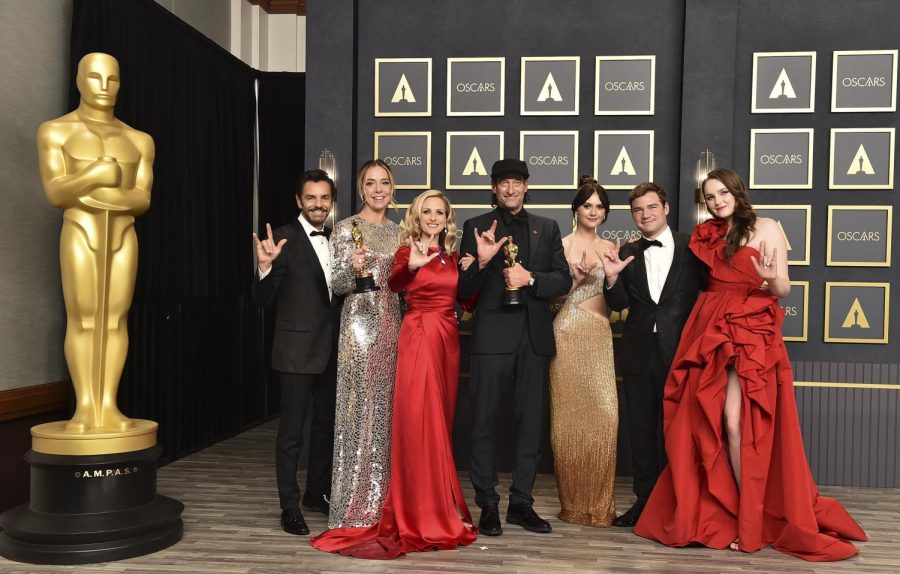Editorial | ‘CODA’ sets great precedent for disability representation in movies
Photo by Jordan Strauss/Invision/AP
Eugenio Derbez, from left, Sian Heder, Marlee Matlin, Troy Kotsur, Emilia Jones, Daniel Durant, and Amy Forsyth, winners of the award for best picture for “CODA,” pose in the press room while signing “I love you” at the Oscars on Sunday, March 27, 2022, at the Dolby Theatre in Los Angeles.
March 30, 2022
There are 41.1 million people in the United States who are disabled. Despite this, only two disabled actors — prior to this year’s Academy Awards — have won Oscars.
At the very eventful 94th annual Academy Awards, the film “CODA” made history by winning both the Best Picture award, and Troy Kotsur winning the Best Supporting Actor award. Kotsur is the first deaf man to win an Academy award for acting and gave an emotional speech, dedicating his award win to the deaf and disabled community.
“CODA” is about Ruby, a child of deaf parents who discovers her passion for singing, and feels like she has to balance living between the hearing and deaf world. It’s a very relatable story as about 90% of children born to deaf parents are hearing. The film gives children of deaf people a story to relate to, and shows everyone else the life experience of a marginalized group.
These historic wins set a great precedent for the Academy to recognize the disabled community’s hard work in entertainment. It also shows Hollywood that stories about disability are worth telling.
In its 94 years, the Academy has only nominated two deaf people for acting awards. Most disabled people are pushed to the margins when it comes to the entertainment industry, despite many able-bodied people winning awards for playing those with disabilities. There shouldn’t be 10 able-bodied lead actors who won Oscars for playing people with disabilities since 1988. Instead, there should be space for disabled actors to depict their own experiences and tell the stories that affect them.
The first deaf actor to win an Academy Award was Kotsur’s co-star, Marlee Matlin, nearly 35 years ago. The lack of recognition from the Academy for stories about deaf and disabled people is astounding — there shouldn’t be such a long gap between the nominations of deaf actors. Kotsur and the cast of “CODA” deserve recognition, but it should have come much sooner.
Despite the recent push to diversify the Academy Awards, the disabled community has been pushed aside and their hard work has yet to be properly appreciated. During last year’s Oscars, more than 50 movies received nominations, yet only three centered on stories about disabled people. “CODA” opens up many more opportunities to tell these stories.
The historic wins for “CODA” proves that people connect to stories about disabled people, and will hopefully lead to a diversified awards process where the incredible talents of disabled actors, writers and filmmakers are recognized.



